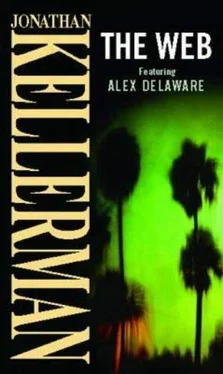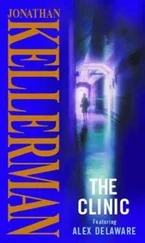The second officer looked back at us for a moment, then straight ahead. He pointed. The pilot did something and the copter shuddered and rose.
We headed out to sea, hooking southeast and following the coastline. High enough for me to make out the bladelike shape of the island. South Beach was the point of the dagger, our destination the hilt.
The blockade was no more than a paper cut from this height. The mountaintops were a black leather belt, the banyans obscured by burgeoning darkness and the ring of mountains. The copter veered sharply and the east end of the island slid into view.
Concrete shore and choppy water, no trees or sand or reefs. The windward harbor was a generous soupspoon indentation. Natural port. Ships large enough to look significant from these heights were moored there. Some of them moved. Strong waves- I could see the froth, piling up against a massive seawall.
We turned north toward the base: empty stretches of black veined with gray, toy-block assemblages that had to be barracks, some larger buildings.
The copter descended and we touched down perfectly, the trip as brief as an amusement park ride, the blockade's cruel efficiency clearer than ever. The pilot cut the engine and exited without a word. The second officer waited till the rotors had quieted before releasing our door.
We got out and were hit by a blast of humid air, stale and chemically tainted.
"The windward side," said Moreland. "Nothing grows here."
***
A sailor in a contraption that resembled an oversize golf cart drove us through a sentry post and past the barracks, storehouses, hangars, empty airstrips. Concrete fields crowded with planes and copters and disassembled craft made me think of Harry Amalfi's aerial junkyard. Some of the planes were antiques, others looked new. One sleek passenger jet, in particular, would have done a CEO proud.
The harbor was blocked from view by the seawall, a monstrous thing of the same raw construction as the blockade. Above it, an American flag whipped and snapped like a locker-room towel. I could hear the ocean charging angrily, hitting the concrete with the roar of a gladiator audience.
Looking toward the base's western border, I saw the area where Picker must have gone down. At least half a mile away. Twenty-foot chain-link fencing completed the banyans' prison. Creedman had said the base was run by a skeleton crew, and there were very few sailors on the ground- maybe two dozen, walking, watching.
The golf cart veered across a nearly empty parking lot, through a small drab garden, up to a colonial building, three stories high, white board and brick, green shutters.
HEADQUARTERS
CAPT. ELVIN S. EWING
Next door was a one-story building of the same design. The Officers' Club.
Inside the club was a long walnut hallway- deep red wool carpeting patterned with crossed sabers, brass fixtures. The paneling was lined with roiling seascapes and model ships in glass cases.
Another sailor took us to a waiting room decorated with photo blowups of fighter jets and club chairs. A sailor in dress uniform stood behind a host's lectern. Glass doors opened to a dining room: soft lighting, empty tables, the smell of canned vegetable soup and melted cheese.
The sailors saluted one another, and the first one left without breaking step.
"This way," said the one behind the lectern. Young, with clipped hair and a soft face full of pimples. He took us to an unmarked door. A sign hanging from the knob said Captain Ewing had reserved the room.
Inside were one long table under a hammered-copper chandelier and twenty bright blue chairs. A portrait of the President wearing an uneasy smile greeted us from behind the head chair. Three walls of wood, one blocked by blue drapes.
A new sailor came and took our cocktail order. Two different men brought the drinks.
Creedman sipped his martini and licked his lips. "Nice and dry. Why can't we get vermouth like this in the village, Bill?"
Moreland stared at his tomato juice and shrugged.
"I asked the Trading Post to get me something dry and Italian," said Creedman. "Took a month and what I ended up with was some swill from Malaysia."
"Pity."
"Go to any duty-free in the booniest outpost and they've got everything from Chivas to Stoli, so what's the big deal about filling an order here? It's almost as if they want to do it wrong."
"Is that the theme of your book?" said Pam. "Incompetent islanders?"
Creedman smiled at her over his drink. "If you're that curious about my book, maybe you and I should get together and discuss it. That is, if you've got any energy after your swims."
Moreland walked to the blue drapes and parted them.
"Same view," he said. "The airfield. Why they put a window here, I'll never know."
"Maybe they like to see the planes take off, Dad," said Pam.
Moreland shrugged again.
"How long did you and Mom live here?"
"Two years."
Three men came in. Two wore officer's garb- the first was fiftyish, tall and thickset, with rough red skin and steel glasses; the other even taller, ten years younger, with a long, swarthy, rubbery face and restless hands.
The man between them had on a beautiful featherweight gray serge suit that trimmed ten pounds from his two hundred. Six feet tall, heavy shouldered and narrow hipped, with a square face, bullish features, slit mouth, rancher's tan. His shirt was soft blue broadcloth with a pin collar, his foulard a silver and wine silk weave. His hair was bushy and black on top, the temples snow-white. The contrast was almost artificial, as dramatic in real life as on TV.
He looked like Hollywood's idea of a senator, but Hollywood had nothing to do with his becoming one, if newspapers and magazines could be believed.
The story was a good one: born to a young widow in a struggling Oregon logging camp, Nicholas Hoffman had been tutored at home till the age of fifteen, when he'd lied about his age and enlisted in the Navy. By the end of the Korean War, he was a decorated hero who gave the military another fifteen years of distinguished service before entering the real estate business, making his first million by forty and running successfully for the Senate at forty-three. His doctrine was the avoidance of extremes; someone dubbed him Mr. Middle-of-the-Road and it stuck. True believers on both ends tried to use it against him. The voters ignored them, and Hoffman was well into his third term after a no-contest race.
"Bill!" he said, barging ahead of the officers and stretching out a meaty hand.
"Senator," said Moreland softly.
"Oh, Jesus!" roared Hoffman. "Cut the crap! How are you, man?"
He grabbed Moreland's hand and pumped. Moreland remained expressionless. Hoffman turned to Pam. "You must be Dr. Moreland, Junior. Christ, last time I saw you, you were in diapers." He let go of her father and touched her fingers briefly. "You are a doctor?"
She nodded.
"Splendid."
Creedman stuck out his hand and announced himself.
"Ah, the press," said Hoffman. "Captain Ewing told me you were here, so I said invite him, show him open government in action or he'll make something up. On assignment?"
"Writing a book."
"On what?"
"Nonfiction novel."
"Ah. Great."
"What brings you here, Senator?"
"Fact-finding trip. Not one of those sun-and-fun junkets. Real work. Downsizing. Appraising military installations."
Unbuttoning his jacket, he patted his middle. He had a small, hard paunch that tailoring had done a good job of camouflaging.
"And you must be the doctors from California." He stuck out his hand. "Nick Hoffman."
"Dr. Delaware's a psychologist," said Robin. "I build musical instruments."
"How nice…" He glanced at the table. "Shall we, Captain?"
Читать дальше












